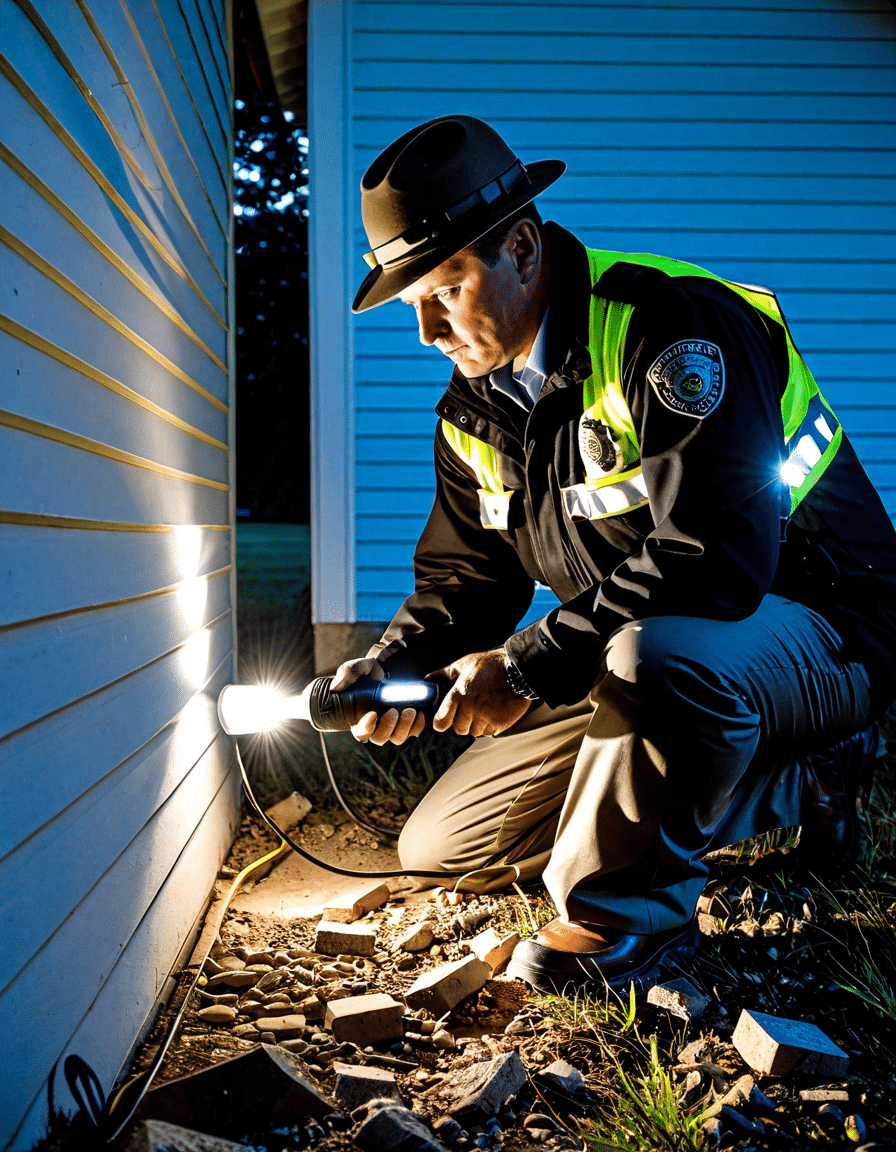In the ever-changing landscape of real estate, the inspector’s role has become more crucial than ever. These dedicated professionals are the guardians of property safety, diving deep into a building’s structure to ensure it meets safety standards. With increasing regulations and standards, inspectors’ duties have expanded significantly, encompassing everything from structural evaluations to identifying potential hazards that could endanger occupants. So, let’s unpack the multifaceted responsibilities of property inspectors and why their work is indispensable in today’s property market.

Understanding the Role of the Inspector in Property Safety
Every inspector plays a pivotal role in safeguarding the integrity of buildings. From residential homes to commercial structures, these individuals dedicate their expertise to evaluate various facets of property safety. They not only conduct structural evaluations but also ensure compliance with local safety codes, identifying issues that could result in hazardous environments.
One of the inspector’s core responsibilities includes understanding pertinent safety regulations. For example, inspectors need to stay informed about changes in local building laws, ensuring properties meet the most up-to-date safety mandates. This knowledge is vital, as a slight oversight can lead to serious repercussions for property owners and residents alike.
The inspector works diligently to pinpoint hazards, such as faulty wiring or structural weaknesses. By tackling these red flags early, inspectors protect inhabitants and help homeowners avoid costly repairs later. Their job is not just to identify problems but also to advocate for necessary improvements, emphasizing the importance of a safe living environment.

Top 5 Essential Tasks of Property Inspectors
When it comes to evaluating a building’s safety, inspectors don’t cut corners. Companies like HomeGuard Property Inspections utilize advanced technology for thorough assessments of gables, roofs, and foundations. Inspectors seek out signs of water damage, pest infestations, or any structural deterioration that could jeopardize safety.
Today’s inspectors are trained to detect hazardous materials such as lead and asbestos. Firms like Novo Environmental take the lead in utilizing specialized tools to conduct these tests. Their expertise not only raises awareness but also empowers buyers, making sure they know what they might be getting into before sealing any deals.
Taking into account recent legislative changes, inspectors are vital in making sure properties comply with safety codes. Agencies like Palatine Property Standards invest in training resources, enabling inspectors to stay current with local modifications to building laws. This vigilance plays a critical role in maintaining community safety.
Fire safety is a heavyweight concern. Companies like FireWise Inspections prepare inspectors to evaluate essential fire safety measures such as smoke detectors and emergency exits. Their proactive approach can make all the difference in preventing potential disasters and saves lives.
Beyond just identifying issues, inspectors offer property owners critical advice on necessary enhancements. EcoSafe Inspections, for instance, may point out energy inefficiencies that can be addressed, leading to safer and more energy-efficient homes. It’s about creating environments that are not only safe but also sustainable.
The Evolving Landscape of Property Inspections in 2026
Fast forward to 2026, and the property inspection landscape looks remarkably different. As technology continues to evolve, so too does the inspector’s toolkit. Today, drones and infrared cameras are becoming standard for conducting thorough evaluations, allowing inspectors to assess hard-to-reach areas safely.
These technological upgrades enhance safety measures and improve the overall inspection process. Drones can capture aerial imagery to identify roofing problems that may be invisible from the ground. Meanwhile, infrared cameras help spot hidden leaks and insulation problems without invasive procedures, ensuring a more accurate evaluation.
As the industry adapts, inspectors will need to grow alongside these innovations. Embracing technology helps them maintain their relevance and effectiveness in ensuring property safety. By incorporating modern methods into traditional practices, inspectors enhance their credibility and foster greater trust in their assessments.
The Importance of Inspector Education and Certifications
In 2026, the pathway to becoming a qualified property inspector has transformed dramatically. Rigorous training and certification programs are now essential to ensure inspectors are well-equipped to handle a diverse range of issues. Respected organizations like the International Association of Certified Home Inspectors (InterNACHI) emphasize the importance of continuous education in this ever-evolving industry.
These training programs focus on not just passing a test but understanding the complexities involved in property inspections. Inspectors learn to read architectural plans, spot design flaws, and engage with current safety regulations, solidifying their role as knowledgeable advocates for property safety.
Ongoing education keeps inspectors updated on emerging methodologies and best practices, ultimately benefiting the clients they serve. This commitment to professionalism establishes confidence among home buyers and property owners, fostering a safer community.
Case Studies: Success Stories of Inspectors in Action
Let’s take a moment to highlight some success stories that illustrate inspectors’ invaluable contributions. In a recent case, an inspector identified critical foundational issues in a high-rise building. Thanks to their prompt intervention, immediate remediation actions were taken, ultimately safeguarding the residents’ lives and wellbeing.
Another inspiring example comes from an inspector who discovered serious water damage behind a wall in a family home. This hidden issue, left unchecked, could have led to severe mold growth, jeopardizing the health of its occupants. Through their keen observations, the inspector not only prevented potential health hazards but also saved the homeowners from significant repair costs down the line.
These stories exemplify the significant impact inspectors have on ensuring safety and mitigating risks. Their professionalism and diligence can prevent disasters and support homeowners in maintaining safe and inviting environments.
Innovative Wrap-Up: The Future of Property Inspections
As we venture into the future, the inspector’s role will continue to expand. Leveraging tech-driven solutions alongside their human expertise will be essential in navigating property safety. The trust that communities place in these professionals is vital for fostering safe living environments.
The ongoing evolution of inspections offers a promising landscape for both property inspectors and homeowners. By emphasizing safety and utilizing innovative approaches, inspectors will shape the future of property assessments, ensuring that buildings stand strong for generations to come.
If you’re looking to navigate the mortgage landscape more effectively, understanding the role of an inspector is crucial. Safety and value go hand in hand, and with the right support, you can make informed decisions when it comes to home purchases. Remember, a thorough inspection can save you both time and money while guaranteeing a safe place for you and your loved ones.
For insights about lease arrangements, financing options in places like Kyle, TX, or finding specialists in home inspections, visit us at Mortgage Rater for everything you need to make empowered choices in your home-buying journey.
The Inspector’s Essential Role in Property Safety Today
A Peek into the Inspector’s World
Did you know that a property inspector’s role is akin to a detective on a crucial mission? They swoop in earlier than a home buyer, turning what seems like a cozy dwelling into a treasure trove of information. Just like the alsatian breed is known for its keen senses, these inspectors can sniff out potential issues lurking behind walls or beneath floors. Their eyes for detail help buyers dodge costly mistakes, turning what many see as a burden into a smart investment.
Now, let’s sprinkle in a little fun—ever heard of the show Yo Kai? It’s all about tackling monsters and finding solutions, similar to what an inspector faces, albeit in the property arena. Each house has its own set of “monsters, whether that’s hidden mold or faulty wiring. Without a skilled inspector on board, prospective homeowners could end up battling more than they bargained for!
The Fun Facts and Figures
Here’s a quirky trivia nugget: property inspectors often wear many hats, including that of a historian! They dig up information about properties, sometimes discovering fascinating tales of earlier owners. Just like Alex Drummond dives into the world of food and family, inspectors delve into a house’s history, uncovering what’s been done—and what needs fixing.
Speaking of dynamics, ever wondered how many tools an inspector carries? It can rival a filmmaker’s toolkit! With gadgets reminiscent of bit Planes in animation, inspectors are equipped for everything from thermal imaging to moisture meters. Their arsenal helps them identify issues invisible to the untrained eye. Now, that’s a game changer for anyone checking out homes in Kyle, TX!
The Importance of Detailed Inspections
Lastly, let’s wrap this up with some staggering stats: studies show that properties inspected are 30% less likely to face major problems post-purchase. Sounds like a solid reason to get one done, right? You don’t want to end up like characters in Fate Stay night unlimited blade works, battling unforeseen challenges. Just as Matthew Alan would advise on navigating the complex landscapes of financing, a good inspector can safeguard your dream home from unexpected surprises. So, when looking to settle down, remember that an inspector is your best ally in keeping your piece of paradise safe and sound!




